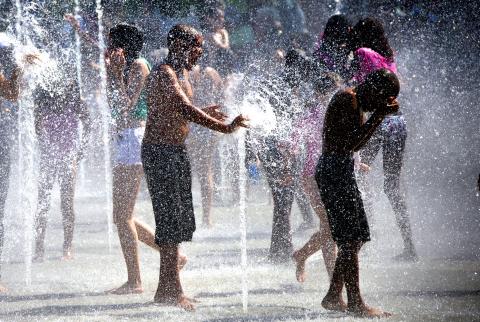If the heat makes you cranky, take heart: you’re not alone, according to a study out on Thursday in the US journal Science that links rising tempers to hot temperatures.
The link could have worrying implications as the Earth’s climate warms, researchers at the University of California at Berkeley and Princeton University said.
While making predictions about the future is always iffy, lead author Solomon Hsiang said the current trend is clear: Hotter weather makes people more violent.

Photo: EPA
Hsiang and his fellow researchers conducted a meta-analysis of 60 studies across a range of disciplines, including archeology, climatology, political science and economics. One study, for instance, showed that, during the hotter and drier periods of the El Nino southern oscillation, “the probability of any country in the tropics starting a new civil war doubles.”
Other studies showed the incidence of interpersonal conflicts — from murder to rape to domestic violence and other types of assault — goes up when it gets hot.
“We were surprised by both the consistency and the strength” of the link, Hsiang said, explaining it was evident no matter what timeframe was being examined, whether a short heat wave, a years-long drought or a cycle over centuries.
“We do think the overall size of the effects is sufficiently large that we want to take them seriously and seriously consider whether or not our actions today are going to influence the level of violence in our children’s world tomorrow,” Hsiang added.
To rule out other factors for the rise in violence, the authors used a statistical analysis that compared single geographic locations to themselves over time — so that the political, cultural and geographic histories were internally consistent.
They also tried to compare levels of violence where the climatic factors were very localized, to see how violence levels compared nearby where the weather stayed cooler.
In all cases, “the collected evidence shows that humans across the globe have proven poorly equipped to deal with exposure to hotter temperatures,” co-lead author Marshall Burke said in a statement.
What was less clear was why, with researchers citing several theories and noting that more than one could play a role.
In times of drought or when harvests fail, economic factors might push groups to take up arms.
High unemployment tends to leave a large pool of frustrated, bored young people in cities — fertile recruiting ground for an army.
And the heat also seems to have a physiological effect that drives people to violent impulses, one that can be observed after just a few hours of exposure.
Hsiang compared the trend to the increase of car accidents on a rainy day — it does not mean any one accident happened solely because it rained. Nor does it mean accidents only happen when it rains.
“Driver error ultimately causes accidents, but rain can make it much more likely,” he said in the statement. “Similarly, violent conflicts might occur for a variety of reasons that simply become more likely when climatic conditions deteriorate.”

Brazil, the world’s largest Roman Catholic country, saw its Catholic population decline further in 2022, while evangelical Christians and those with no religion continued to rise, census data released on Friday by the Brazilian Institute of Geography and Statistics (IBGE) showed. The census indicated that Brazil had 100.2 million Roman Catholics in 2022, accounting for 56.7 percent of the population, down from 65.1 percent or 105.4 million recorded in the 2010 census. Meanwhile, the share of evangelical Christians rose to 26.9 percent last year, up from 21.6 percent in 2010, adding 12 million followers to reach 47.4 million — the highest figure

A Chinese scientist was arrested while arriving in the US at Detroit airport, the second case in days involving the alleged smuggling of biological material, authorities said on Monday. The scientist is accused of shipping biological material months ago to staff at a laboratory at the University of Michigan. The FBI, in a court filing, described it as material related to certain worms and requires a government permit. “The guidelines for importing biological materials into the US for research purposes are stringent, but clear, and actions like this undermine the legitimate work of other visiting scholars,” said John Nowak, who leads field

‘THE RED LINE’: Colombian President Gustavo Petro promised a thorough probe into the attack on the senator, who had announced his presidential bid in March Colombian Senator Miguel Uribe Turbay, a possible candidate in the country’s presidential election next year, was shot and wounded at a campaign rally in Bogota on Saturday, authorities said. His conservative Democratic Center party released a statement calling it “an unacceptable act of violence.” The attack took place in a park in the Fontibon neighborhood when armed assailants shot him from behind, said the right-wing Democratic Center, which was the party of former Colombian president Alvaro Uribe. The men are not related. Images circulating on social media showed Uribe Turbay, 39, covered in blood being held by several people. The Santa Fe Foundation

NUCLEAR WARNING: Elites are carelessly fomenting fear and tensions between nuclear powers, perhaps because they have access to shelters, Tulsi Gabbard said After a trip to Hiroshima, US Director of National Intelligence Tulsi Gabbard on Tuesday warned that “warmongers” were pushing the world to the brink of nuclear war. Gabbard did not specify her concerns. Gabbard posted on social media a video of grisly footage from the world’s first nuclear attack and of her staring reflectively at the Hiroshima Peace Memorial. On Aug. 6, 1945, the US obliterated Hiroshima, killing 140,000 people in the explosion and by the end of the year from the uranium bomb’s effects. Three days later, a US plane dropped a plutonium bomb on Nagasaki, leaving abut 74,000 people dead by the